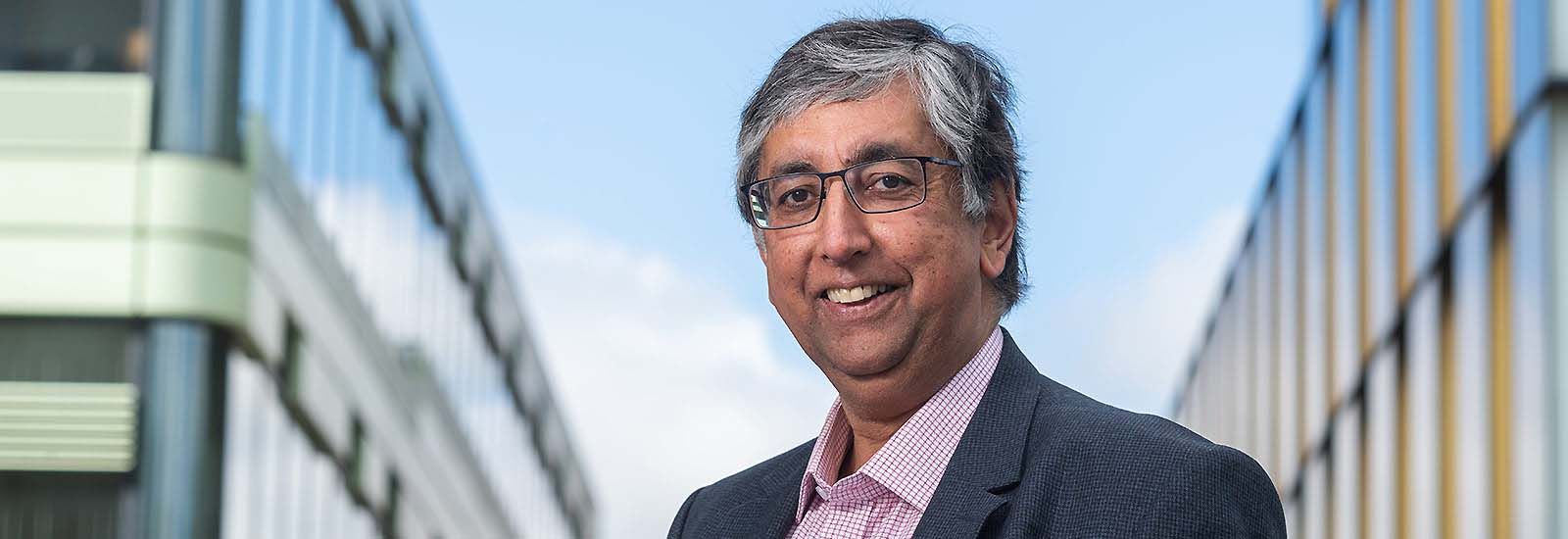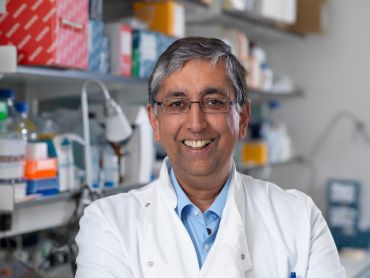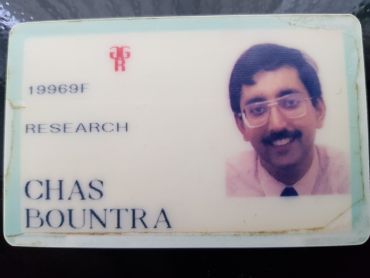
The glass half full man: Professor Chas Bountra and Oxford's innovative future
Forget the TV clichés about Oxford – all punting and pass the port. The 925-year-old university is full of the most amazing people who are helping and benefiting the world, well beyond the quads and spires, says Professor Chas Bountra, the university’s Pro-Vice-Chancellor for Innovation.
After the events of the last two years - and the COVID-19 vaccine [2.5 billion doses delivered and counting] - this most enthusiastic champion of Oxford maintains there can be no doubt, innovation is part and parcel of the historic university’s future. Who knows what is coming next, he says, expectantly.
‘Everyone across the university has been inspired by the vaccine team,’ insists Professor Bountra. ‘They have seen what is feasible...[the creation of the vaccine and the work with Astra Zeneca] must be one of the biggest knowledge transfers in history.’
I’m so proud of what the vaccine team achieved...people wanted hope, they were desperate for hope and our colleagues gave them hope, and eventually a route out of this wretched pandemic
Professor Bountra
Professor Bountra is fizzing with undisguised enthusiasm, as he discusses everything from a dementia cure [do not count on it], to the COVID-19 vaccine [just fantastic] to the faculty [incredible] and the students [astonishing]. He really does not want to talk about himself – although this is supposed to be an interview about him. The self-effacing professor wants to talk only about Oxford and the future – ‘far more interesting’.
He maintains, ‘I’m so proud of what the vaccine team achieved...people wanted hope, they were desperate for hope and our colleagues gave them hope, and eventually a route out of this wretched pandemic. People looked to scientists to come up with answers, people were scared and some still are scared....and worried.’
This, he suggests is the beginning of a new age, he says, ‘Everyone at Oxford wants to come up with solutions for the world’s biggest problems. They’re inspired.’
There are quite a few problems to be going on with, without pause he lists the climate emergency (bio-diversity; carbon capture; new batteries….); inequalities; impact of technology on society, – as well as all the medical conditions for which there is no current cure. Mental health was a massive problem before COVID-19, it is even bigger post – I fear we have yet to realise the full impact of restrictions on especially the young
‘These are big problems and people are looking to places such as Oxford to solve them, he says.
Professor Bountra maintains the university is responding to challenges across the board, ‘People throughout the university are working on all these problems. Everyone is involved: all four corners of the university: scientists, medics, engineers, mathematicians, Social Scientists, lawyers, ethicists, writers……and many external stakeholders and partners.’
As Professor of Translational Medicine and Director of the Centre for Medicines Discovery, Professor Bountra knows more than most about advances. [In a previous existence, he discovered and helped bring to market a number of medicines, including one for Irritable Bowel Syndrome]. And, alongside his innovation portfolio, he is leading a team at the Centre for Medicines Discovery currently working on many common (including dementia, cancer) and rare diseases. But he does not want to talk about this either.
Setting aside his own work, he talks with awe of the achievements of the vaccine pioneers, who have been honoured for their work, ‘Adrian Hill established the Jenner Institute about twenty years ago, and he and Sarah Gilbert founded a company called Vaccitech about 5 years ago. At the start of the pandemic they teamed with our VC, Regius, Head of the Medical Sciences Division, colleagues in our technology transfer group, Astra Zeneca, government, regulators and funders to focus on a single goal: create a vaccine for the world.
He saw Professor Gilbert getting on her bicycle one day during lockdown and says people would wonder that she was not being ‘whisked off’ in a chauffeur driven car. He adds, ‘She has worked so hard. Parents will be naming their new-born girls Sarah after her
He saw Professor Gilbert getting on her bicycle one day during lockdown and says people would wonder that she was not being ‘whisked off’ in a chauffeur driven car. He adds, ‘She has worked so hard. Parents will be naming their new-born girls Sarah after her. I and this whole university is so proud of these colleagues.’
Professor Bountra exclaims, ‘It’s absolutely remarkable what they have done. He is also full of admiration too for vaccine partner Astra Zeneca, ‘They have been very courageous, working with Oxford and not making a profit.’
He adds with seriousness, ‘Other drug companies have made tens of billions in the past year – in the same period AstraZeneca has made no profit’. We should all applaud the AstraZeneca leadership. I would love to know how our university leaders engineered this outcome. I am convinced that no other university on the planet would have done this.'
As if it were in any doubt, he adds, ‘I’m a glass half full man.’
Professor Bountra maintains, ‘Everyone is now looking to all great universities such as Oxford to create important benefits for patients, individuals/ societies, industry and economies all over the world. They don’t just want us to train the next generation and do great research. They also want us to make the world a better place, they are looking for impacts of our scholarship and research.’
 The innovator: Professor Bountra in the lab
The innovator: Professor Bountra in the lab‘Gone are the days when students just went into traditional careers, and had traditional bosses,’ declares Professor Bountra. ‘Young people today want to do something that has impact, they want to change the world, they care so much about this planet.’
He points out, in the last year, 31 companies have been spun-out from this university – making a total of more than 150 Oxford-driven companies, based on research-driven ideas.
There must be a Musk or Jobs or Gates…. in our community. I hope we can develop the next big technology or platform that will make the world a better place. If it enables a new industry, thousands of jobs, and helps the local and national economy that will be a plus
Professor Bountra
‘Oxford is going to be a bit like Boston [Mass.] – with the university, the hospitals, and many companies (some our own creations), investors, funders…….We have to ensure that it remains an attractive place to live.
'There must be a Musk or Jobs or Gates…. in our community. I hope we can develop the next big technology or platform that will make the world a better place. If it enables a new industry, thousands of jobs, and helps the local and national economy that will be a plus.'
Professor Bountra says the way government, funders, industry and academia came together during the pandemic is a model for solving future problems – especially in his medical world.
‘Sally Davies [the former chief medical officer] has long been talking about anti-microbial resistance,’ he says. ‘By 2050, it is thought,10 million people a year could be dying because of resistance to existing antibiotics...why don’t we come together, again, and start building a new generation of antibiotics...all the necessary skill sets exist or are accessible in academia? I know this is the vision of Chris Schofield and Tim Walsh – both in this great uni. We can do it.'
Professor Bountra well understands the need to take risks and put in hard work. His parents took enormous risks, coming to the UK from India, arriving with little money, no jobs, no friends or relatives, and no home.
‘I don’t think I could do it,’ he says, with wonder. ‘It takes a lot of courage. I have enjoyed the benefits of loving parents [although he lost his father nearly twenty years ago] - they made so many sacrifices for me.’
Professor Bountra well understands the need to take risks and put in hard work. His parents took enormous risks, coming to the UK from India, arriving with little money, no jobs, no friends or relatives, and no home. He says, ‘I don’t think I could do it
A close family, after the initial lockdown, Professor Bountra drove to Birmingham to see his mother, who still lives in the neighbourhood where the family settled. She came back with him to Oxford. He is sorry to have separated his mother from her friends, although, he says, she spends a lot of time on the phone. But he is very glad she is with his family – which has now been blessed, Professor Bountra says, with the addition of his first grandchild. His joy and pride at this is evident.
 Pride and joy
Pride and joyProfessor Bountra joined GlaxoSmithKline, becoming its Vice President and Head of Biology. He was involved in the identification of more than 40 clinical candidates for many gastro-intestinal, inflammatory and neuro-psychiatric diseases. This led to the development and launch of the first treatment for Irritable Bowel Syndrome and the creation of a pioneering anti- emetic drug for cancer patients undergoing chemotherapy. This industry experience proved invaluable when returning to academia, by informing research and helping to establish new collaborative projects with pharma companies and healthcare organisations.
 First day at Glaxo Research Group - 1988.
First day at Glaxo Research Group - 1988.The glass is very much half full, if not more [given the new addition to the Bountra clan]. He adds with delight, ‘I’m very lucky to be where I am. I’ve had amazing role models and mentors and I am at the number one university in the world.’
The glass is very much half full, if not more...He adds with delight, ‘I’m very lucky to be where I am. I’ve had amazing role models and mentors and I am at the number one university in the world
Despite his own medical background, Professor Bountra is emphatic about the university’s wide-ranging strengths, ‘We’ve got the best medical school on the planet, as well as massive strengths in sciences, engineering, Mathematics. No one can doubt our leadership in Social Sciences and the Humanities. We are surrounded by superstars. I believe we are in the broadest and best university on the planet.’
As pro-vice chancellor for innovation, Professor Bountra has worked closely with all senior colleagues in the university. ‘They all care so much and work so hard...particularly Louise [Professor Richardson, the Vice Chancellor]. But it is not just them, it is people throughout the university, in the departments and the colleges, and our global alumni....I’m working with remarkable people, having the time of my life….and guess what I get paid for it!!.’
With his innovation hat firmly on, he adds, ‘Oxford is a great place to make things happen. We’ve got the people, the ideas, the resources, the brand name and a collaborative culture.’
Reeling off the names of some of Oxford’s illustrious and not-yet illustrious researchers, he says, ‘Oxford has a culture of big problem solving, working together across departments and disciplines, with external stakeholders, with other institutions and with other countries….this university could go to even greater strengths.
‘My ambition is to attract many more investors to Oxford, build partnerships with diverse global companies, create more space for innovation and help our great leaders and innovators create more benefits for people, place and planet.'
Oxford is a great place to make things happen. We’ve got the people, the ideas, the resources, the brand name and a collaborative culture...You have to have moon-shot thinking and even if you don’t make the moon-shot, you can achieve step changes
Professor Bountra
With his sights set on establishing a new GSK, Microsoft or Tesla, Professor Bountra is nothing if not ambitious, ‘There are millions of researchers in the world, but few who are also great leaders, or great innovators or great entrepreneurs. In Oxford we have far more than our share.
If there were any thought that universities would slip back into some sort of academic obscurity post-pandemic, Professor Bountra has other ideas, ‘Look around. Oxford is changing, it is more innovative, more entrepreneurial, more connected, more global, more ambitious, more confident and more impactful.'
He insists, ‘You have to have moon-shot thinking and even if you don’t make the moon-shot, you can achieve step changes.....’
Implicit, but unspoken: you ain’t seen nothing yet.
By Sarah Whitebloom